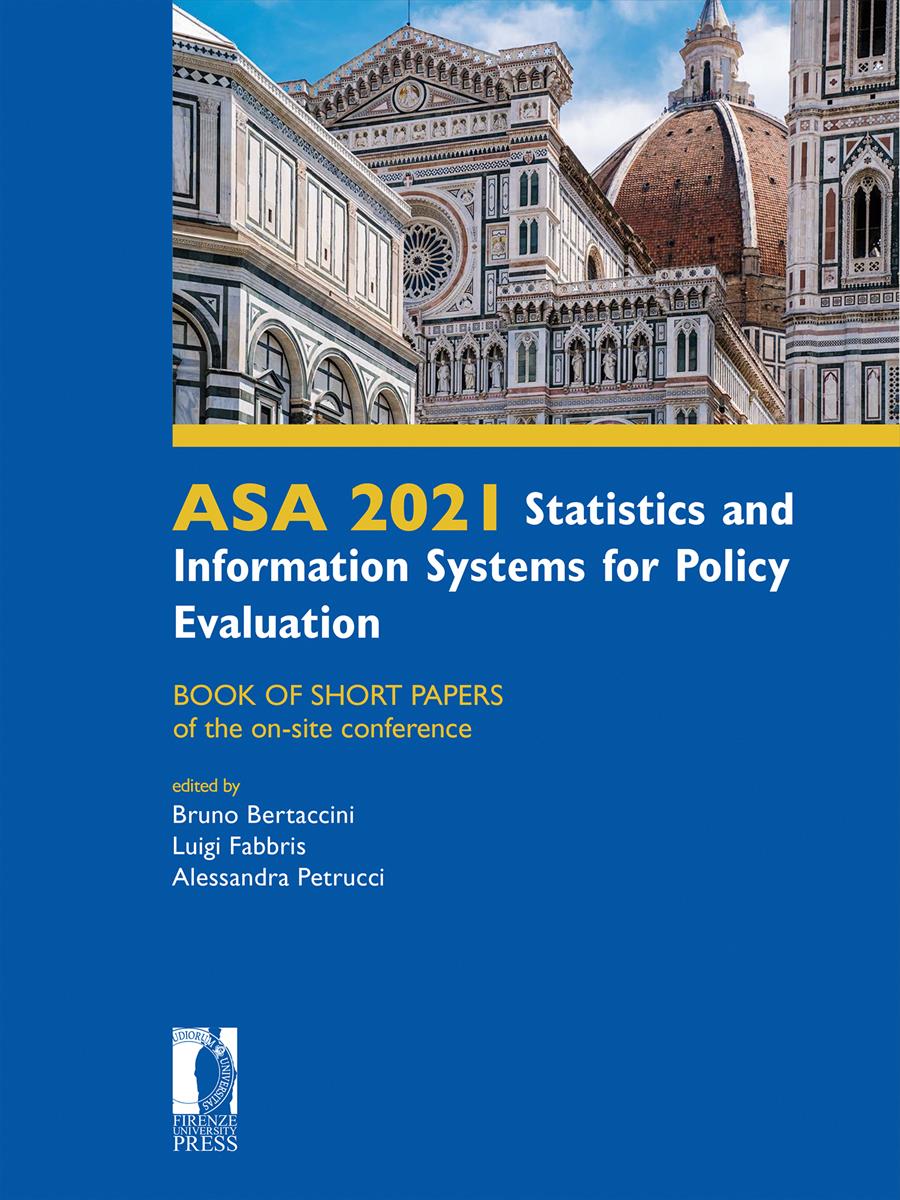- ASA 2021 Statistics and Information Systems for Policy Evaluation
- Edited by Bruno Bertaccini, Luigi Fabbris, Alessandra Petrucci
Mapping and factoring the 2007 ATECO categories in regard to specialised human capital
- Luigi Fabbris
- Paolo Feltrin
- © 2021 Author(s) |
- CC BY 4.0
- DOI: 10.36253/978-88-5518-461-8.18
The paper describes an exercise of classification of a subset of five-digit categories of the 2007 ATECO classification system of economic activities. The analysis is grounded on the hypothesis that economic sectors can be clustered according to the competency level required to human resources recently working in industries or services in Italy. The analysis may be useful to evaluate a possible relationship between economic development and education. The analysis consisted of a mapping and then a clustering of the Ateco categories according to the between-distribution dissimilarity of any possible couple of categories. The basic idea was to highlight the Ateco categories that require either more education than others or more education and working experience (human capital) than others, pinpointing, in particular, the categories that require larger percentages of tertiary education and those residing close to territorial hubs. The competency level was measured with a combination of educational attainment and in-service experience of Italian employees, as defined by Istat, the Italian statistical institute. The employees’ educational level was evaluated with the frequency distribution of five (ordinal) classes of education of people employed in 2018 and 2019 in both private and public establishments and offices; the working experience with a logarithmic transform of the average number of in-service years of employees. The analysis highlighted both a sort of input-related classification of the economy and a supply-side classification of the labour market. The results are in line with the theory of the existence of a cluster of creative companies residing close to territorial hubs.
- Keywords:
- Category Mapping,
- Ateco 2007,
- Clustering economic categories,
- Human capital,
- Creative companies,
University of Padua, Italy - ORCID: 0000-0001-8657-8361
University of Trieste, Italy - ORCID: 0000-0003-2801-5151
- Autor, D.H., Levy, F., Murnane, R.J. (2003). The skill content of recent technological change: An empirical exploration. Quarterly Journal of Economics, 118(4), pp. 1279-1334.
- Becattini, G. (1990). The Marshallian industrial district as a socio-economic concept, in F. Pyke, G. Becattini and W. Sengenberger (eds). Industrial Districts and Inter-Firm Cooperation in Italy (pp. 37-51). Geneva: IILS.
- Bertamino, F., Bronzini, R, De Maggio, M., Revelli, D. (2014). Local policies for innovation: The case of technological districts in Italy (https://www.bancaditalia.it/pubblicazioni/altriatti-convegni/2014-innovazione-italia/Bertamino-Bronzini-DeMaggio-Revelli.pdf).
- Browne, M.W. (2001). An overview of analytic rotation in exploratory factor analysis. Multivariate Behavioral Research, 36(1), pp. 111–150.
- Colombo M., Delmastro M. (2002). How effective are technology incubators? Evidence from Italy, Research Policy, 31, pp. 1103-1122.
- Etzkowitz H., Leydesdorff L. (1997). Universities and the Global Knowledge Economy. London: Pinter.
- European Commission (2013). Entrepreneurship 2020 Action Plan. Reigniting the Entrepreneurial Spirit in Europe. Brussels: DG Internal Market, Industry, Entrepreneurship and SMEs.
- Fabbris, L., Feltrin, P. (2021). Measuring the movement between employment and selfemployment: a survey proposal. In: B. Bertaccini, L. Fabbris and A. Petrucci (eds.) ASA 2021 Statistics and Information Systems for Policy Evaluation (pp. 65-70), Firenze University Press, Florence (https://fupress.com/capitoli/measuring-the-movement-betweenemployment-and-self-employment-a-survey-proposal/6065).
- Krugman, P. (2017). The gambler’s ruin of small cities (Wonkish) (https://www.nytimes.com/2017/12/30/opinion/the-gamblers-ruin-of-small-cities-wonkish.html).
- Liberati, D., Marinucci, M., Tanzi, G.M. (2013). Science and technology parks in Italy: Main features and analysis of their effects on hosted firms (https://www.bancaditalia.it/pubblicazioni/altri-atti-convegni/2014-innovazione-italia/Liberati-Marinucci-Tanzi.pdf).
- Moretti, E. (2012). The New Geography of Jobs. Boston, New York: Houghton Mifflin Harcourt.
- OECD (2019). The Future of Work. OECD Employment Outlook 2019. Highlights (https://oe.cd/employment-outlook).
Chapter Information
Chapter Title
Mapping and factoring the 2007 ATECO categories in regard to specialised human capital
Authors
Luigi Fabbris, Paolo Feltrin
Language
English
DOI
10.36253/978-88-5518-461-8.18
Peer Reviewed
Publication Year
2021
Copyright Information
© 2021 Author(s)
Content License
Metadata License
Bibliographic Information
Book Title
ASA 2021 Statistics and Information Systems for Policy Evaluation
Book Subtitle
BOOK OF SHORT PAPERS of the on-site conference
Editors
Bruno Bertaccini, Luigi Fabbris, Alessandra Petrucci
Peer Reviewed
Publication Year
2021
Copyright Information
© 2021 Author(s)
Content License
Metadata License
Publisher Name
Firenze University Press
DOI
10.36253/978-88-5518-461-8
eISBN (pdf)
978-88-5518-461-8
eISBN (xml)
978-88-5518-462-5
Series Title
Proceedings e report
Series ISSN
2704-601X
Series E-ISSN
2704-5846
